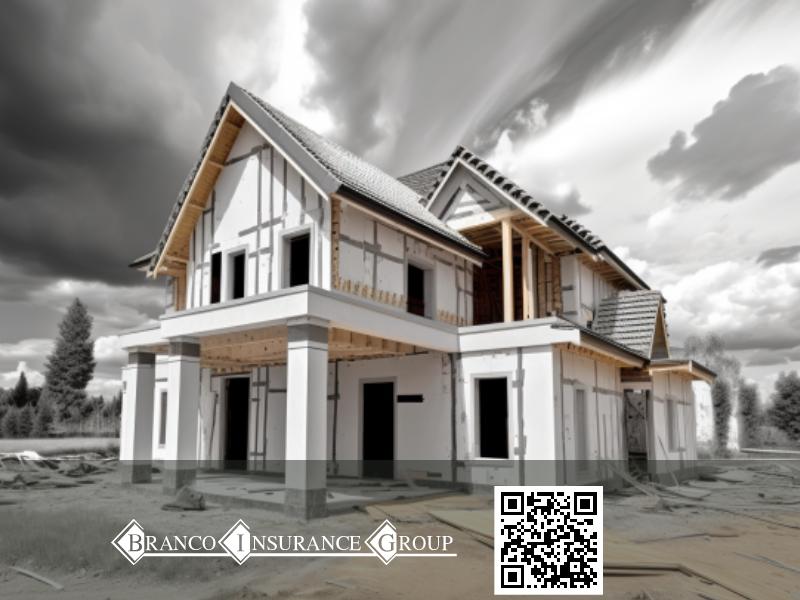House flipping has become an increasingly popular and profitable venture for real estate investors. However, this exciting world of transformations and potential returns is not without its risks.
To ensure the success of your house flipping project, it’s crucial to understand the importance of proper insurance coverage tailored specifically to this type of investment.
Traditional homeowner’s insurance policies simply won’t cut it when it comes to safeguarding your flip against unforeseen mishaps like property damage, injuries, or legal liabilities.
In this blog post, we’ll delve into these risks in detail and discuss why procuring the right kind of house-flipping insurance is vital for protecting both your investment and peace of mind.
Key Takeaways
- Flipping houses involves risks such as property damage, injuries to workers/visitors, and legal liabilities that require specialized insurance coverage.
- Traditional homeowner’s insurance policies won’t cover house flipping; investors need a builder’s risk policy (for direct physical damage) and liability insurance (to protect against bodily injury claims).
- Proper insurance is essential for protecting your investment and avoiding financial losses. It provides peace of mind and satisfies lender requirements while covering unexpected losses or damages during renovations or sales processes. Workers’ compensation insurance should also be included to avoid costly medical expenses.
- Choose the right types of coverage by assessing project risks, researching online options, consulting with an experienced agent, and selecting reputable providers offering sufficient coverage at reasonable prices.
Risks Involved In Flipping Houses
Flipping houses can come with risks such as property damage during renovation, injuries to workers or visitors, and legal liabilities that can be costly.
Property Damage During Renovation
One of the inherent risks of flipping houses is the potential for property damage during the renovation process. Even with a skilled team and meticulous planning, unexpected issues can arise that may result in costly setbacks.
As a real estate investor, it’s crucial to be prepared for these situations by having appropriate insurance coverage in place. A builder’s risk policy typically covers direct physical damage caused during construction or remodeling phases and ensures that you are financially protected against such unforeseen incidents.
Injuries To Workers Or Visitors
House flipping projects often involve a variety of skilled professionals, such as contractors and subcontractors, working on the property. With so many people on-site handling tools and equipment, there is an increased risk of accidental injuries to workers or visitors.
For instance, a worker might sustain injuries from falling off a ladder while painting, or a visitor may trip over construction materials left unattended.
As real estate investors in the business of flipping houses, it’s crucial to have adequate insurance coverage that protects against potential workplace accidents and resulting liability claims.
Obtaining proper general liability insurance ensures financial responsibility in case of bodily injury sustained by workers or visitors during the renovation process. Furthermore, including workers’ compensation insurance offers additional protection for employees working on your flip project by covering medical treatment expenses and lost wages due to work-related injuries.
Legal Liabilities
House-flipping ventures can lead to various legal liabilities that every investor should be aware of and prepared for. For instance, a house flipper may face lawsuits stemming from accidents or injuries sustained by workers, neighbors, or visitors on the property.
To mitigate these risks, it’s essential to invest in general liability insurance designed for real estate investors. This type of coverage protects you against claims of bodily injury and property damage arising from your renovation activities.
An example scenario where this would apply is if a visitor trips over construction equipment left at the site and sustains an injury – without liability insurance in place, you may be personally responsible for their medical treatment costs and potential legal fees associated with such an accident.
Why Proper Insurance Is Important For Flipping Houses
Proper insurance is crucial for flipping houses because traditional homeowner’s insurance policies will not cover house flipping, leaving you exposed to financial risks such as unexpected losses and legal liabilities.
Traditional Homeowner’s Insurance Policies Will Not Cover House Flipping
If you’re looking to flip a house, it’s important to understand that your traditional homeowner’s insurance policy won’t cover any potential losses. This is because flipping houses involves higher risks than homeownership, such as property damage during renovations or injuries to workers and visitors.
Without proper insurance coverage, while flipping houses, you may be putting your personal assets at risk if something goes wrong. Luckily, there are specialized builder’s risk policies and liability insurances that can help protect your investment and finances in case of unexpected losses or legal liabilities.
Types Of Insurance Needed For House Flipping (builder’s Risk Policy And Liability Insurance)
Flipping houses requires different insurance coverage than what is provided by a typical homeowners’ policy. As a baseline, dwelling insurance and premises liability are recommended for house flippers. However, the right insurance for flipping houses usually consists of at least two plans: a builder’s risk policy and liability insurance. Here are some more details about these types of policies:
- Builder’s Risk Policy: This type of policy is designed to protect your investment during the renovation process. It covers losses due to property damage or theft while the property is being renovated.
- Liability Insurance: This type of policy provides coverage in case someone is injured on the property during the flip. It can also cover any legal fees associated with claims made against you.
It’s important to note that there are additional types of insurance coverage that may be needed depending on the specific details of your house-flipping project. Consult with an experienced insurance agent to determine what types of coverage make sense for your situation.
Protection Of Your Investment
One of the most significant reasons to have proper insurance for flipping houses is to protect your investment. When you’re renovating a house, things can go wrong. Property damage or theft during construction are real risks that could result in costly repairs or replacements, eating away at your profits.
Additionally, liability claims that come from injuries on the property can also be financially devastating if you aren’t properly insured.
Insurance protection for house flipping also satisfies lender requirements which ensures that everything runs smoothly throughout your project and gives lenders confidence in working with you since they know their investments are safe too.
Coverage Of Unexpected Losses
One of the main benefits of having insurance coverage for flipping houses is protection against loss. It’s essential to have sufficient coverage in case unexpected events occur during the renovation or sales process, such as natural disasters like hurricanes or floods that could damage the property.
Property insurance policies can provide financial reimbursement for damages caused by perils like fire, theft, and vandalism. Liability coverage can also help protect your finances if someone gets injured on the property or files a lawsuit.
Meeting Lender Requirements
When applying for a loan to fund your house-flipping project, meeting the lender’s requirements is crucial to ensure you get the financing you need. One of these requirements is having proper insurance coverage that protects both the property and anyone who visits it.
Lenders typically require house flippers to have builder’s risk insurance, which provides coverage on materials, labor costs, and additional expenses incurred during construction.
Additionally, liability insurance may be necessary to protect investors in case someone gets injured while working on or visiting the site.
Peace Of Mind
Having proper insurance coverage for your house flipping project provides peace of mind as a homeowner. Knowing that you have protection in case of unexpected losses or damages allows you to focus on the project itself rather than worrying about financial responsibility.
Imagine finding out that your contractor’s negligence caused bodily injury to someone on the job site and being held responsible for medical treatment costs and legal fees.
With liability insurance, these costs can be covered by your policy, giving you one less thing to worry about. Additionally, having builder’s risk insurance means that if there is property damage during renovations or construction materials are stolen, you won’t have to pay for repairs out of pocket or halt the project entirely due to a lack of funds.
Types Of Insurance Coverage Needed For Flipping Houses
To fully protect your investment, it’s crucial to have the right types of insurance coverage for flipping houses, including property insurance, liability insurance, workers’ compensation insurance, and builder’s risk insurance.
Property Insurance
One of the essential types of insurance coverage needed for flipping houses is property insurance. This type of policy will protect your investment from various perils that may cause damage to your property during renovations or while it’s vacant.
Property insurance covers losses resulting from fires, thefts, vandalism, and any other issues that may affect the value of your home.
Investment properties require a different kind of property insurance than regular homeowners’ policies because they sit vacant for extended periods. Vacant homes are at higher risk for damages due to break-ins, burst pipes, and other accidents since no one is staying in them regularly.
Liability Insurance
Liability insurance is an essential component of any comprehensive house flipping insurance policy. This type of insurance provides coverage for injuries or damages that occur on the property during renovation work.
Liability coverage protects you, the owner, from lawsuits and financial losses due to accidents or incidents that may happen as a result of your flip project. For instance, if someone falls and gets injured while working on your flipped house, they may file a lawsuit against you for their medical expenses and other related costs.
Moreover, if you plan to sell your flipped property at market value after renovating it, general liability coverage can also give potential buyers peace of mind knowing that they are protected from any legal liabilities associated with the property’s history prior to being sold.
Keep in mind that without proper liability coverage during a house flip project, you could face thousands or even millions in legal fees and settlements should something go wrong.
Workers’ Compensation Insurance
One of the most critical types of insurance for a house flipper is Workers’ Compensation Insurance. This insurance covers medical costs associated with any work-related injuries that may occur during the house flipping process, including workplace accidents and bodily injury to workers or visitors on the property.
Without this coverage, a flipper could be liable for costly medical treatment expenses and even face lawsuits from injured parties.
Builders’ Risk Insurance
Builders’ risk insurance is a type of policy designed to provide coverage for direct physical damage to property during renovation or construction. This type of insurance protects investors and house flippers from financial losses due to damages, such as vandalism or weather-related events, that may occur while the property is being worked on.
Builders’ risk insurance is crucial for anyone involved in flipping houses because traditional homeowner’s policies won’t cover properties undergoing renovations. Without proper coverage, investors could be held liable for any damages or accidents that occur during the renovation process.
How To Choose The Right Insurance For Flipping Houses
To choose the right insurance for flipping houses, assess the risks involved in the project, research and compare insurance options, choose a reputable insurance provider, consult with an insurance agent, and consider factors such as projected market value and rehab costs.
Assess The Risks Involved In The Project
Before embarking on any house flipping project, it is important to assess the risks involved in the project. This means considering what could go wrong and preparing for those scenarios with proper insurance coverage.
Risks can include property damage during renovation, injuries to workers or visitors, and legal liabilities. For example, if a worker falls while roofing an unoccupied property you own as an investor, you could be held liable for their injuries or medical expenses.
Assessing these risks will give you a better idea of the type of insurance policies needed to ensure that your investment is protected from unexpected losses. You’ll want to consider builder’s risk insurance to protect against damages occurring during renovations or repairs, while general liability insurance would provide protection should anyone be injured at the property during construction.
Research And Compare Insurance Options
When it comes to finding the right insurance coverage for flipping houses, research and comparison are key. Take some time to identify the risks involved in your project and then consider what types of insurance you need to protect yourself against those risks.
Once you have a clear idea of what you’re looking for, start researching different insurance providers and policies that offer the appropriate coverage.
For example, builder’s risk insurance is an essential type of coverage for house flippers since it protects against damage or loss during construction. Some homeowners insurance policies might provide limited protection during renovations but may not be sufficient if extensive work is required on the property.
Choose A Reputable Insurance Provider
When it comes to finding the right insurance for flipping houses, choosing a reputable insurance provider is crucial. You want an insurer that has experience in insuring investment properties and understands the unique risks involved in house flipping.
One way to find a good candidate is by asking for recommendations from other flippers or real estate investors. They may have valuable insights into which providers offer the best coverage at reasonable prices.
Additionally, be sure to do your own research on potential insurers, checking their reviews and credentials before making any decisions.
Consult With An Insurance Agent
Choosing the right insurance for flipping houses can be overwhelming, which is why it’s essential to consult with a professional, licensed insurance agent. An agent can provide expert advice on the types of coverage needed for your specific project and help you navigate through the complexities that come with house flipping insurance.
An experienced agent will know which insurance companies specialize in providing coverage for real estate investors and their portfolios, ensuring that you get the best possible policy at an affordable price.
Factors To Consider When Choosing Insurance
When choosing insurance for flipping houses, there are several important factors to consider. Firstly, it is essential to assess the risks involved in the project and identify which types of coverage will be necessary.
Secondly, it is crucial to research and compare different insurance options available in the market. It’s advisable that you choose a reputable insurer with experience covering house-flipping projects who understands your specific needs as an investor.
Finally, considering how much coverage you need is key, as well as evaluating potential costs vs. benefits or associated financial implications should anything go wrong throughout the process from start to finish can help ensure you have adequate protection in place while also avoiding unnecessary expenses or delays down the line.
Overall it’s important to remember that investing in an appropriate house flipping insurance policy makes good business sense, protecting not only your investment but, more importantly, yourself financially from potential losses along the way, such as injuries or damage that will occur during renovations. Because let’s face it- flipping houses comes with high risks!
Final Thoughts
Flipping houses can be a profitable investment, but it also comes with significant risks. As a responsible flipper, getting the right insurance coverage is crucial for protecting your investment and avoiding financial losses.
Traditional homeowner’s insurance policies won’t cover house flipping, so it’s important to get specialized builder’s risk policy and liability insurance. With the right insurance, you have peace of mind knowing that unexpected losses are covered and you meet lender requirements.
Don’t overlook property insurance when flipping houses; it could save you from legal fees or worse yet – liability claims in case of accidents or injuries during renovations on your property. If you are ready for a quote or if you still have questions about the best insurance options for your house-flipping business, our experts at Branco Insurance Group can help. Get in touch with us today to learn more!





